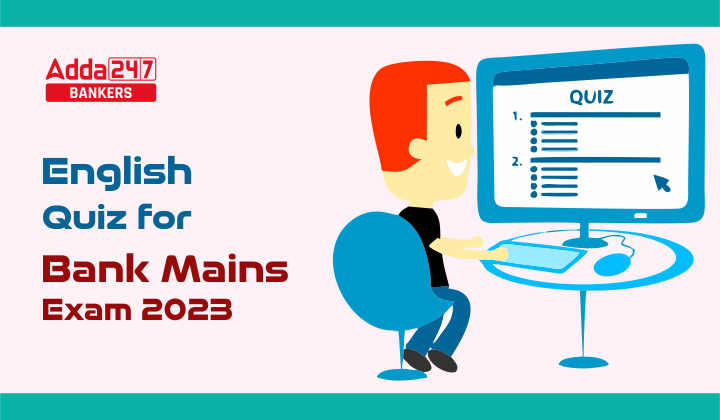Directions (1-5): Read the following passage and answer the given questions. Some words are highlighted to help you answer the questions.
Before the invention of the World Wide Web (WWW), the earliest internet users were mainly researchers and military personnel. The network was complicated and, although it was possible to share files and messages, the interface was not user-friendly. In 1993, a researcher at CERN called Tim Berners-Lee started building a layer on top of the internet to make it easier to access, according to the World Wide Web Foundation.
Berners-Lee’s idea was to make information available as pages, written in a shared language called Hypertext Markup Language (HTML). This eventually became the World Wide Web, which is the platform used by billions of internet users around the world. After completing his first-class degree in physics at Oxford University, Berners-Lee moved on to become a scientist at CERN, the European Organization for Nuclear Research in 1989, according to the World Wide Web Consortium (W3C). That same year, Berners-Lee published a paper titled “Information Management: A Proposal”, in which he suggested the combination of hypertext and the internet for an information management system.
In this _______(I)_______ proposal for the World Wide Web, Berners-Lee described the shortcomings of the then-current system at CERN in allowing scientists access to their information and documentation. Though the internet had been around for a decade, the information had limited accessibility. Berners-Lee set out to connect both the internet and a web-structured platform to revolutionise data sharing. To achieve this, he created the Hypertext Transfer Protocol (HTTP), Uniform Resource Identifier (URI) and Hypertext Makeup Language (HTML), the building blocks for internet browsing that remain in use today, according to CERN.
Created to better serve CERN scientists and assist those across the globe with their research, Berners-Lee launched the first website, http:// info.cern.ch, in 1990. This new way to obtain information was something Berners-Lee wanted the entire world to have access to. He decided to make the World Wide Web an open and royalty- free software, allowing it to grow beyond academia.
By 1994 there were around 3,000 websites in existence, according to the World Economic Forum. After such a roaring success, Berners-Lee created W3C, a web standards organisation that also develops web specifications, guidelines, software and tools. With the continued success of the iconic ‘www.’, Berners-Lee founded the World Wide Web Foundation in 2009, an organisation working to deliver digital equality to the world.
Q1. According to the passage, what is CERN?
(a) Uniform Resource Identifier
(b) World Wide Web Consortium
(c) Hypertext Markup Language
(d) the European Organization for Nuclear Research
(e) None of these
Q2. What was the original idea which led to the conception of internet?
(a) The idea behind the development of World Wide Web was to help people in remote areas get their ideas across to each other.
(b) To make knowledge available in the form of pages written in a common language known as Hypertext Markup Language (HTML).
(c) It was invented to help the different governments of the world to collect data about their countries’ population.
(d) Both (a) and (c)
(e) All of these
Q3. Which of the following statement is incorrect in accordance to the information given in the passage?
(I) In 1994, Berners-Lee launched the World Wide Web Foundation, an organisation dedicated to achieving global digital equality.
(II) People from the military were among the first to utilise the internet.
(III) Berners-Lee established the first website to better serve CERN scientists and aid researchers all over the world with their research.
(a) Only (III)
(b) Both (I) and (III)
(c) Only (I)
(d) Only (II)
(e) All of them
Q4. Which of the following word will be placed in the blank (I)?
(a) measly
(b) strident
(c) initial
(d) avaricious
(e) None of these
Q5. Choose the synonym of TOOLS as highlighted in the passage.
(a) Altercation
(b) Nuance
(c) Retention
(d) Temperament
(e) Apparatus
Solutions
S1. Ans (d)
Sol. The correct answer is option (d): the European Organization for Nuclear Research.
The answer is present in the second paragraph where it is mentioned: After completing his first-class degree in physics at Oxford University, Berners-Lee moved on to become a scientist at CERN, the European Organization for Nuclear Research in 1989…….
S2. Ans (b)
Sol. The correct answer is option (b): To make knowledge available in the form of pages written in a common language known as Hypertext Markup Language (HTML).
This answer can be found in the first line of second paragraph: Berners-Lee’s idea was to make information available as pages, written in a shared language called Hypertext Markup Language (HTML).
S3. Ans (c)
Sol. The correct answer is option (c): Only (I).
This statement is incorrect because the last paragraph states: With the continued success of the iconic ‘www.’, Berners-Lee founded the World Wide Web Foundation in 2009, an organisation working to deliver digital equality to the world.
The correct information is stated in the statements (II) and (III).
Statement (II) is the first line of the passage: Before the invention of the World Wide Web (WWW), the earliest internet users were mainly researchers and military personnel.
Statement (III) is also correct because the first line of the last paragraph states: Created to better serve CERN scientists and assist those across the globe with their research, Berners-Lee launched the first website, http:// info.cern.ch, in 1990.
S4. Ans (c)
Sol. The correct answer is option (c): initial. It means of, relating to, or occurring at the beginning; first.
Avaricious- having or showing an extreme greed for wealth or material gain.
Measly- ridiculously small or few.
Strident- (of a sound) loud and harsh; grating.
S5. Ans (e)
Sol. The correct answer is option (e): apparatus. It means the technical equipment or machinery needed for a particular activity or purpose.
Altercation- a noisy argument or confrontation.
Nuance- a subtle difference in meaning.
Retention- the act of keeping something.
Temperament- usual mood or feelings.





 English Language Quiz For Bank Foundatio...
English Language Quiz For Bank Foundatio...
 English Language Quiz For Bank Mains Exa...
English Language Quiz For Bank Mains Exa...


